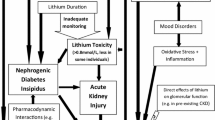Abstract
Although lithium is an effective treatment of various mood disorders, including those in elderly patients, it is often underutilized out of fear of its adverse effects. Current evidence does not support a conclusive link between lithium treatment and chronic kidney disease (CKD) in elderly patients, especially those with normal pre-morbid renal function. The appropriate use of preventative strategies may help prevent CKD and further renal decline in elderly patients receiving lithium.

Similar content being viewed by others
References
Rej S, Elie D, Mucsi I, et al. Chronic kidney disease in lithium-treated older adults: a review of epidemiology, mechanisms, and implications for the treatment of late-life mood disorders. Drugs Aging. 2015;32(1):31–42.
Grof P. Sixty years of lithium responders. Neuropsychobiology. 2010;62(1):8–16.
Shulman KI, Rochon P, Sykora K, et al. Changing prescription patterns for lithium and valproic acid in old age: shifting practice without evidence. BMJ. 2003;326(7396):960.
National quality use of medicines indicators for Australian hospitals. Sydney: Australian Commission on Safety and Quality in Health Care and NSW Therapeutic Advisory Group Inc.; 2014.
Crowe E, Halpin D, Stevens P. Early identification and management of chronic kidney disease: summary of NICE guidance. Guideline Development Group. BMJ. 2008;2008(337):a1530.
Rej S, Looper K, Segal M. The effect of serum lithium levels on renal function in geriatric outpatients: a retrospective longitudinal study. Drugs Aging. 2013;30(6):409–15.
van Melick EJ, Meinders AE, Hoffman TO, et al. Renal effects of long-term lithium therapy in the elderly: a cross-sectional study. Int J Geriatr Psychiatry. 2008;23(7):685–92.
Rej S, Shulman K, Herrmann N, et al. Prevalence and correlates of renal disease in older lithium users: a population-based study. Am J Geriatr Psychiatry. 2014;22(11):1075–82.
Rej S, Abitbol R, Looper K, et al. Chronic renal failure in lithium-using geriatric patients: effects of lithium continuation versus discontinuation—a 60-month retrospective study. Int J Geriatr Psychiatry. 2013;28(5):450–3.
Close H, Reilly J, Mason JM, et al. Renal failure in lithium-treated bipolar disorder: a retrospective cohort study. PLoS One. 2014;9(3):e90169.
Coresh J, Selvin E, Stevens LA, et al. Prevalence of chronic kidney disease in the United States. JAMA. 2007;298(17):2038–47.
Andreazza AC, Gildengers A, Rajji TK, et al. Oxidative stress in older patients with bipolar disorder. Am J Geriatr Psychiatry. 2015;23(3):314–9.
Aiff H, Attman PO, Aurell M, et al. End-stage renal disease associated with prophylactic lithium treatment. Eur Neuropsychopharmacol. 2014;24(4):540–4.
Aiff H, Attman PO, Aurell M, et al. The impact of modern treatment principles may have eliminated lithium-induced renal failure. J Psychopharmacol. 2013;28(2):151–4.
Rej S, Li BW, Looper K, et al. Renal function in geriatric psychiatry patients compared to non-psychiatric older adults: effects of lithium use and other factors. Aging Ment Health. 2014;18(7):847–53.
Aprahamian I, Santos FS, dos Santos B, et al. Long-term, low-dose lithium treatment does not impair renal function in the elderly: a 2-year randomized, placebo-controlled trial followed by single-blind extension. J Clin Psychiatry. 2014;75(7):e672–8.
Hardy BG, Shulman KI, Zucchero C. Gradual discontinuation of lithium augmentation in elderly patients with unipolar depression. J Clin Psychopharmacol. 1997;17(1):22–6.
Head L, Dening T. Lithium in the over-65 s: who is taking it and who is monitoring it? A survey of older adults on lithium in the Cambridge Mental Health Services catchment area. Int J Geriatr Psychiatry. 1998;13(3):164–71.
Tredget J, Kirov A, Kirov G. Effects of chronic lithium treatment on renal function. J Affect Disord. 2010;126(3):436–40.
Bendz H, Schön S, Attman PO, et al. Renal failure occurs in chronic lithium treatment but is uncommon. Kidney Int. 2010;77:219–24.
Collins N, Barnes TR, Shingleton-Smith A, et al. Standards of lithium monitoring in mental health trusts in the UK. BMC Psychiatry. 2010;10:80.
Ng F, Mammen OK, Wilting I, et al. The International Society for Bipolar Disorders (ISBD) consensus guidelines for the safety monitoring of bipolar disorder treatments. Biopolar Disord. 2009;11(6):559–95.
Hardy BG, Shulman KI, Mackenzie SE, et al. Pharmacokinetics of lithium in the elderly. J Clin Psychopharmacol. 1987;7(3):153–8.
Oakley PW, Whyte IM, Carter GL. Lithium toxicity: an iatrogenic problem in susceptible individuals. Aust N Z J Psychiatry. 2001;35(6):833–40.
van Melick EJ, Souverein PC, den Breeijen JH, et al. Age as a determinant of instability of serum lithium concentrations. Ther Drug Monit. 2013;35(5):643–8.
Juurlink DN, Mamdani MM, Kopp A, et al. Drug-induced lithium toxicity in the elderly: a population-based study. J Am Geriatr Soc. 2004;52(5):734–8.
Vestergaard P, Amdisen A, Hansen HE, et al. Lithium treatment and kidney function. A survey of 237 patients in long-term treatment. Acta Psychiatr Scand. 1979;60(5):504–20.
Weinstein JR, Anderson S. The aging kidney: physiological changes. Adv Chronic Kidney Dis. 2010;17(4):302–7.
Kilbourne AM, Goodrich DE, Lai Z, et al. Randomized controlled trial to assess reduction of cardiovascular disease risk in patients with bipolar disorder: the Self-Management Addressing Heart Risk Trial (SMAHRT). J Clin Psychiatry. 2013;74(7):e655–62.
Bedford JJ, Weggery S, Ellis G, et al. Lithium-induced nephrogenic diabetes insipidus: renal effects of amiloride. Clin J Am Soc Nephrol. 2008;3(5):1324–31.
Ghannoum M, Lavergne V, Yue CS, et al. Successful treatment of lithium toxicity with sodium polystyrene sulfonate: a retrospective cohort study. Clin Toxicol (Phila). 2010;48(1):34–41.
Trepiccione F, Christensen BM. Lithium-induced nephrogenic diabetes insipidus: new clinical and experimental findings. J Nephrol. 2010;23(Suppl 16):S43–8.
Chen CH, Lee CS, Lee MT, et al. Variant GADL1 and response to lithium therapy in bipolar I disorder. N Engl J Med. 2014;370(2):119–28.
Werneke U, Ott M, Salander Renberg E, et al. A decision analysis of long-term lithium treatment and the risk of renal failure. Acta Psychiatr Scand. 2012;126(3):186–97.
Author information
Authors and Affiliations
Consortia
Ethics declarations
The article was adapted from Drugs & Aging 2015;32(1):31–42 [1] by salaried/contracted employees of Adis/Springer and was not supported by any external funding.
Rights and permissions
About this article
Cite this article
Adis Medical Writers. Preventative strategies may reduce the risk of chronic kidney disease in elderly patients receiving lithium. Drugs Ther Perspect 31, 443–447 (2015). https://doi.org/10.1007/s40267-015-0250-9
Published:
Issue Date:
DOI: https://doi.org/10.1007/s40267-015-0250-9




